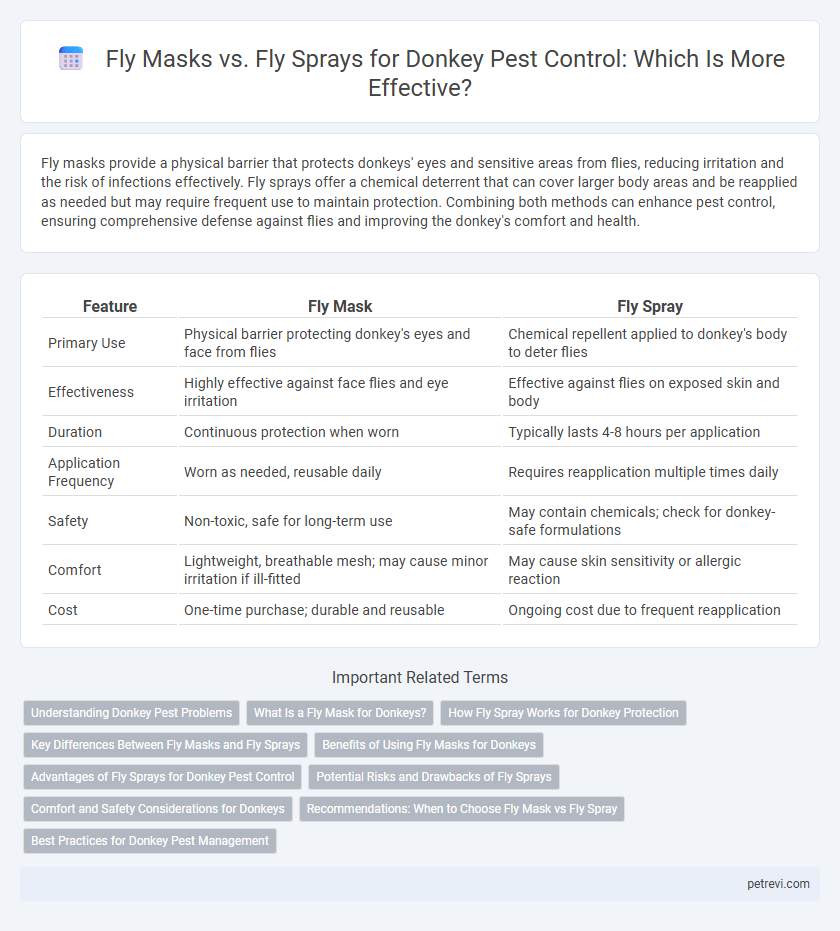Fly masks provide a physical barrier that protects donkeys' eyes and sensitive areas from flies, reducing irritation and the risk of infections effectively. Fly sprays offer a chemical deterrent that can cover larger body areas and be reapplied as needed but may require frequent use to maintain protection. Combining both methods can enhance pest control, ensuring comprehensive defense against flies and improving the donkey's comfort and health.
Table of Comparison
| Feature | Fly Mask | Fly Spray |
|---|---|---|
| Primary Use | Physical barrier protecting donkey's eyes and face from flies | Chemical repellent applied to donkey's body to deter flies |
| Effectiveness | Highly effective against face flies and eye irritation | Effective against flies on exposed skin and body |
| Duration | Continuous protection when worn | Typically lasts 4-8 hours per application |
| Application Frequency | Worn as needed, reusable daily | Requires reapplication multiple times daily |
| Safety | Non-toxic, safe for long-term use | May contain chemicals; check for donkey-safe formulations |
| Comfort | Lightweight, breathable mesh; may cause minor irritation if ill-fitted | May cause skin sensitivity or allergic reaction |
| Cost | One-time purchase; durable and reusable | Ongoing cost due to frequent reapplication |
Understanding Donkey Pest Problems
Donkeys are prone to flies and other insects that cause irritation and potential infections, making effective pest control essential for their health. Fly masks provide a physical barrier protecting sensitive areas like eyes and ears from flies, reducing the risk of eye infections and stress. Fly sprays offer a temporary chemical deterrent that can cover larger body areas but require frequent reapplication to maintain effectiveness against persistent flies.
What Is a Fly Mask for Donkeys?
A fly mask for donkeys is a protective mesh covering designed to shield their eyes, ears, and face from biting insects such as flies and mosquitoes. Made from durable, breathable materials, it prevents irritation and reduces the risk of fly-borne diseases without obstructing vision or airflow. Fly masks offer a long-lasting, chemical-free solution for pest control, especially suitable for donkeys sensitive to sprays or allergic reactions.
How Fly Spray Works for Donkey Protection
Fly spray works by creating a protective barrier on the donkey's skin and coat, repelling flying insects such as flies, mosquitoes, and gnats that cause irritation and potential infections. The active ingredients in fly sprays, often including pyrethroids or natural oils like citronella, disrupt the pests' nervous systems, reducing their presence and preventing bites. Regular application of fly spray ensures continuous protection, especially during peak insect activity in warm weather, enhancing the donkey's comfort and health.
Key Differences Between Fly Masks and Fly Sprays
Fly masks provide a physical barrier that protects a donkey's eyes and face from flies, reducing irritation and preventing fly-borne infections, while fly sprays chemically repel or kill flies on contact. Fly masks offer long-lasting protection without repeated application, lasting several hours to days depending on the brand, whereas fly sprays require frequent reapplication, especially after sweating or rain. Fly masks are ideal for continuous protection during turnout or resting periods, while fly sprays work well for quick, short-term fly relief during active hours.
Benefits of Using Fly Masks for Donkeys
Fly masks provide durable and long-lasting protection against biting flies and other pests that irritate donkeys, reducing stress and preventing eye infections. Made from breathable, lightweight materials, fly masks offer comfort while maintaining visibility, making them ideal for continuous wear during outdoor activities. Unlike fly sprays, which require frequent reapplication and may contain chemicals, fly masks deliver a chemical-free, hassle-free pest control solution for donkeys.
Advantages of Fly Sprays for Donkey Pest Control
Fly sprays provide effective and quick relief from pests by creating a protective barrier that repels flies and insects on donkeys. They often contain insecticides like pyrethrins or permethrin, which target a broad spectrum of pests and reduce irritation and disease transmission. Unlike fly masks, fly sprays cover hard-to-reach areas such as the donkey's body and legs, enhancing overall pest control efficacy.
Potential Risks and Drawbacks of Fly Sprays
Fly sprays for donkey pest control often contain chemicals that can irritate the donkey's sensitive skin and respiratory system, leading to allergic reactions or discomfort. Prolonged exposure to these sprays may cause toxin buildup, posing long-term health risks such as liver or kidney damage. Unlike fly masks, sprays require frequent reapplication and can wash off easily, reducing their effectiveness against persistent fly infestations.
Comfort and Safety Considerations for Donkeys
Fly masks provide a physical barrier that prevents flies from irritating a donkey's eyes and face, reducing stress without the use of chemicals. Fly sprays offer targeted pest control but may cause skin irritation or allergic reactions, making it essential to choose formulations safe for donkeys. Ensuring proper fit and application of fly masks and selecting non-toxic, donkey-friendly sprays optimize comfort and safeguard equine health during pest control.
Recommendations: When to Choose Fly Mask vs Fly Spray
Fly masks provide long-lasting physical protection against flies, making them ideal for extended outdoor exposure or when donkeys have sensitive skin prone to irritation. Fly sprays offer quicker, targeted relief and are best for short-term use or when immediate suppression of fly activity is needed, especially in shaded or indoor environments. Choosing between fly mask and fly spray depends on environmental conditions, donkey behavior, and the duration of pest control required.
Best Practices for Donkey Pest Management
Fly masks provide a physical barrier that protects donkeys from biting flies and other pests, reducing irritation and the risk of disease transmission. Fly sprays offer convenience and immediate relief by repelling or killing insects on contact but require frequent application to maintain effectiveness. Combining the use of fly masks during peak fly activity with regular fly spray applications ensures comprehensive and effective donkey pest management.
Fly mask vs Fly spray for Donkey Pest Control Infographic

 petrevi.com
petrevi.com